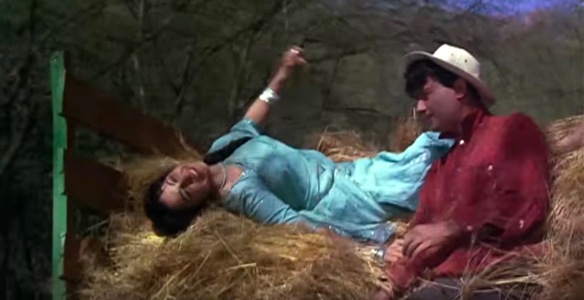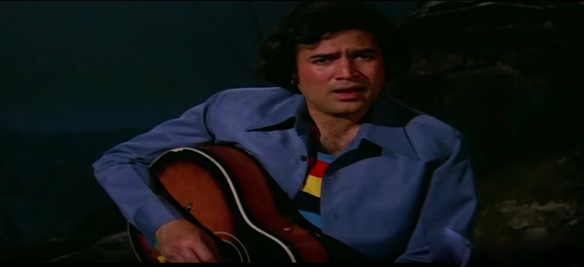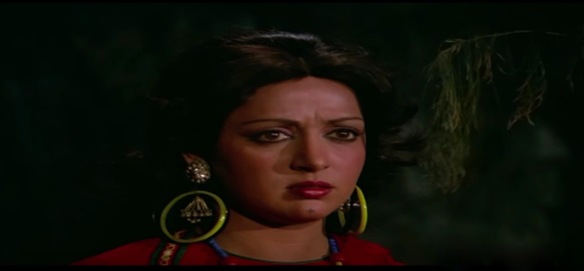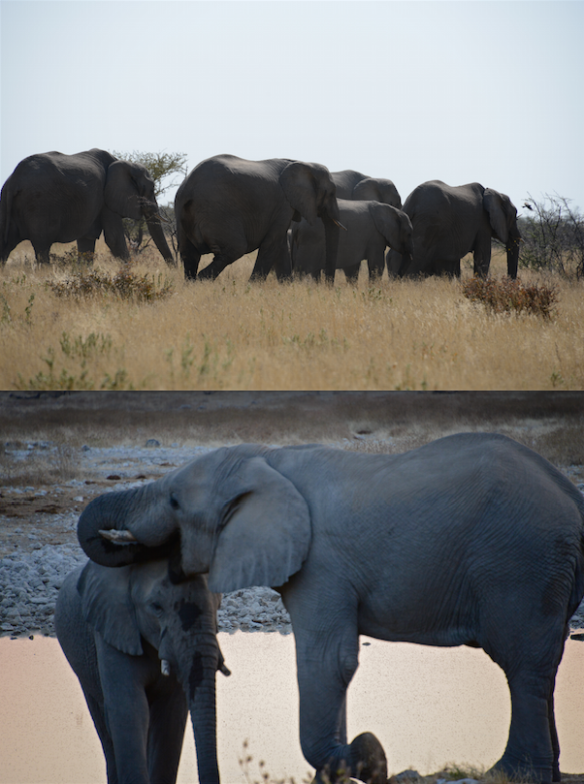
We are not worthy of Waheeda Rehman glistening in head-to-toe teal in “Aaj Phir Jeene Ki” from Guide (1965).
Today we present the English translation and lyrics to “Aaj Phir Jeene Ki” from the cult classic film Guide (1965). A stirring exploration of the Vedic transformation from materialism to freedom from worldly attachments, Guide is routinely listed among the greatest Bollywood films ever made. Based on the classic novel by R.K. Narayan “The Guide,” the film unearths profound depths beneath a glittery surface of a scandalous romance: Raju (played by Dev Anand) is a smooth-talking tour guide who is mesmerized by a vivacious young dancer, Rosy (played by Waheeda Rehman), the wife of an elderly archaeologist. Trapped in a loveless marriage of convenience, Rosy dreams of becoming a famous performer while masking her shame of being the daughter of a courtesan. While her lofty ambitions and enchanting on-screen presence initially propel Rosy to the foreground of the narrative, Raju’s nuanced, reflective character is the real star of the film whose philosophical awakening bestows the film its larger-than-life greatness.

Waheeda Rehman finds a renewed zeal to live with the support of Dev Anand in Guide (1965).
Raju observes with quiet fascination Rosy’s marital discord as he leads her and her husband on a tour of historical caves. His curiosity quickly blossoms into something more as her despair leads to attempted suicide as Rosy’s husband carries on an affair with a local villager. Raju finds himself assuming the role of her protector, whisking Rosy to the city where she purchases a set of ghungroos (dancing bells) from a street stall. The bells transform her instantly into capricious, joyful young woman who realizes how much she has to life for. As she prances back to the countryside, swirling through the Rani Padmini Palace and Chittorgh Fort in Rajasthan along the way, Waheeda Rehman’s “Aaj Phir Jeene Ki” (sung by Lata Mangeshkar) is a song of rebirth.
Guide is a landmark for its ceiling-smashing plot and careful, stunning cinematography that keep pace with its stellar soundtrack composed by S. D. Burman. Follow along with the video here to see how director Vijay Anand cuts between high-angle and low-angle shots that brilliantly mirror the unpredictable oscillations of Rosy’s mood.
Aaj Phir Jeene Ki Tamana Lyrics and Translation:
Kaa.Nto.N se khee.Nch ke yeh aa.Nchal
I pulled my saari away from thorns
ToD ke bandhan baandhe paayal
I broke my shackles when I tied these anklets
Koii na roko dil ki udaa.N ko
Let know no one stop the soaring of my heart
Dil woh chalaa aa aa aa aa aa…
There goes my heart…
Aaj phir jeene ki tamannaa hai
Today I have the desire to live again
Aaj phir marne ka iraadaa hai
Today I intend to die again
Apne hii bas mei.N nahii.N mai.N
I have no control over myself
Dil hai kahii.N to huu.N kahii.N mai.N
My heart is somewhere and I am somewhere else
Ho jaane kya paa ke merii zindagii ne ha.Ns kar kahaa
Who knows what my life gained as it said laughing
Ha ha ha ha ha ha ha…
Aaj phir jeene ki tamannaa hai
Today I have the desire to live again
Aaj phir marne ka iraadaa hai
Today I intend to die again
Mai.N huu.N ghuubaar yaa tuufaa.N huu.N?
Am I a dust storm or a rain storm?
Koii bataaye mai.N kahaa.n huu.N
Someone tell me where I am
Ho Dar hai safar mei.N kahii.N kho na jaauu.N mai.N rastaa nayaa
I fear that I may get lost somewhere in this journey upon a new path
Aa aa aa aa aa…
Aaj phir jeene ki tamannaa hai
Today I have the desire to live again
Aaj phir marne ka iraadaa hai
Today I intend to die again
Kal ke andhero.N se nikal ke
I emerged from the darkness of yesterday
Dekha hai aankhe.N malte malte
I rub my eyes and finally see
Ho phuul hi phuul zindagii bahaar hai, tay kar liyaa
Flowers are everywhere and life is like Spring, I have decided
Aa aa aa aa…
Aaj phir jeene ki tamannaa hai
Today I have the desire to live again
Aaj phir marne ka iraadaa hai
Today I intend to die again
Glossary
kaa.Ntaa: thorn; khee.Nchnaa: to pull; aa.Nchal: end of a saari; toDnaa: to break; bandhan: shackle; paayal: anklet; koii: someone; roknaa: to stop; dil: heart; udaa.N: soaring, flight; aaj: today; phir: again; jeenaa: to live; tamannaa: desire; marnaa: to die; iraadaa: intention; bas mei.N: self-control; kahii.N: somewhere; jaane kyaa: who knows what, wonder what; paanaa: to gain; zindagii: life; ha.Nsnaa: to laugh; ghuubaar: dust storm; tuufaa.N: rain storm; bataanaa: to tell; Dar: fear; safar: journey: kho jaanaa: to become lost; rastaa: path; nayaa: new; andheraa: darkness; nikalnaa: to emerge; malnaa: to rub; phuul: flower; bahaar: Spring; tay karnaa: to decide

The depth of field in the shot allows the viewer to appreciate Dev Anand lagging behind in the background of the Rani Padmini palace in Rajasthan, India where “Aaj Phir Jeene Ki” was filmed on location.
This lovely Lata Mangeshkar solo was requested by fan Yahya. Did you know there was an English-language version of Guide that was even more daring and true to the novel, but never made it to large audiences? More on its fascinating back-story and how American Nobel laureate Pearl S. Buck and Dev Anand became unlikely co-producers in a future post!
Waheeda Rehman and Dev Anand reunited five years later for the film Prem Pujari (1970) that also boasted a gorgeous soundtrack, including the hit love duet “Shokhiyon Mein Ghola.” However, the film failed to capture the magic of their earlier hits and flopped at the box office. Dev Anand would go on to say in many interviews that working on Guide remained the highlight of his career.
-Mrs. 55















